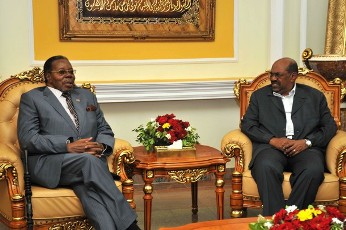US suspends aid to Malawi over governance and receiving Sudanese president
March 23, 2012 (KHARTOUM) – The United States on Friday announced that it is suspending $350 million allocated to Malawi through the Millennium Challenge Corporation (MCC) citing deteriorating human rights in the country.

The $350.7 million MCC Compact was meant to revitalise the country’s faltering energy sector
Several major donors cut their aid last year to the poor southern African nation over concerns about the infringement of democratic freedoms, economic management and governance.
Last week, a loose alliance of opposition and civil society groups backed by influential religious leaders last week gave Malawi’s President Bingu wa Mutharika a two-month deadline to step down or face large protests.
But Mutharika dismissed the call.
“If I wanted to, I would use the majority I have and amend the constitution to rule for another term, or forever,” he told supporters at a rally.
“I will not resign because that’s not what the law says. I will only be able to do that when my term expires in 2014,” Mutharika said.
“While the Government of Malawi had taken initial steps in the right direction after the violence of July 2011, more recent events — including the arrests of opposition and human rights leaders and inflammatory rhetoric by senior government officials — supported MCC’s finding of a pattern of actions inconsistent with good democratic governance” the US body said.
The aid agency board, chaired by US Secretary of State Hillary Clinton, also said it was concerned with the lack of progress on economic policy to bring the country’s International Monetary Fund (IMF) program back on track, which it says has contributed to significant deterioration of the economic environment and put at risk the viability of MCC’s planned compact investments.
MCC also said that Malawi’s invitation to Sudanese president Omer Hassan al-Bashir was also an added factor in the decision to freeze aid.
“Malawi’s decision to allow Sudanese President Omar al-Bashir to attend a trade summit in Lilongwe, despite the International Criminal Court’s (ICC) outstanding warrant for his arrest, further deepened MCC’s concerns,” said the statement.
The Hague-based court issued two arrest warrants for Bashir on 10 counts of war crimes, crimes against humanity and genocide and as a signatory to the ICC’s statute, Malawi was obligated to execute the warrants and arrest the Sudanese leader on its soil.
Malawian President had previously said that African leaders should not be dragged to the ICC for offences committed in Africa.
At the time US Congressman Frank Wolf called on President Barack Obama to cut aid to Malawi.
“We’re asking that the Millennium Challenge (Account) grant be pulled back and canceled, totally canceled, and all foreign aid be ceased. Here we’re going to give American taxpayer dollars in these tight economic times to a country that has welcomed Bashir and that’s inappropriate,” Wolf said.
Malawi’s budget has traditionally relied on aid for about 40% of its funding.
(ST)
